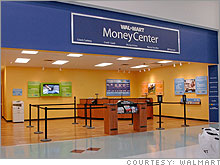Wal-Mart expands low-cost banking servicesWorld's largest retailer says MoneyCenters will offer low-cost services such as check cashing, money orders in about 1,000 locations by 2008.NEW YORK (CNNMoney.com) -- Wal-Mart on Wednesday announced that it will expand its in-store "MoneyCenters" to about 1,000 locations by 2008 These MoneyCenters will offer customers access to low-cost services such as check cashing, money orders and money transfers.
Wal-Mart already operates 225 MoneyCenters and expects to more than double that number to cover a quarter of its stores by the end of 2008. Underscoring its push into financial services, Wal-Mart (Charts, Fortune 500) is broadening its menu of financial products and services, beginning with the launch of the Wal-Mart MoneyCard, a reloadable prepaid Visa rolling out nationally with GE Money and Green Dot. According to Wal-Mart, customers don't need a credit check or bank account to obtain a card. Customers who load $1,000 or more a month won't be charged a monthly of $4.94 and the card is usable anywhere where Visa is accepted. Wal-Mart said it expects its low-cost money services to "help meet the needs of the millions of [its] unbanked and underserved customers." "Many of our customers are paying too much, traveling too far and not being well served," Jane Thompson, president of Wal-Mart financial services, said in a statement. "But they still need to pay their bills, cash their checks and transfer money. We're offering them a safe place and a card to help them manage their money." The discounter said it performs about two million money services transactions per week. It estimates that customers who used Wal-Mart's services in 2006 saved an average $450, or almost $40 per month. With the opening of additional Wal-Mart MoneyCenters, it expects total savings to total savings for its customers to total about $320 million. Wal-Mart entry into financial services has drawn plenty of criticism. In March, the retailer withdrew its controversial application for limited banking operations, after critics feared the retailer would use the bank as a stepping stone to offer a broader range of financial services. Financial services are a higher-margin avenue for the company versus its discount and grocery businesses. Wal-Mart estimates that average transactions and revenue from its money services are growing 30 to 40 percent year-over-year. At the same time, sales at stores open at least a year - a key measure of retail performance - have slowed to a 1 to 3 percent increase from earlier levels of a more than a 5 percent increase per year. Though several other retailers, including rival Target (Charts, Fortune 500) already own banks, Wal-Mart's attempt has met with resistance from the banking industry, community banks and labor unions. Mostly banks feared that Wal-Mart would use that so-called industrial bank status to eventually springboard into the commercial bank business, offering deposit, checking and loan services. In a conference call with reporters to discuss the announcement, Thompson said Wal-Mart did not need its own bank to offer its menu low-cost financial services. "Regarding the MoneyCard, for which a bank id required, GE has the bank for that product," she said. Thompson also said that Wal-Mart could soon announce more products and services. "We may announce something in the next 90 days or less," she said but declined to comment on rumors that Wal-Mart might eventually offer loans such as mortgages and home-equity loans. |
Sponsors
|

